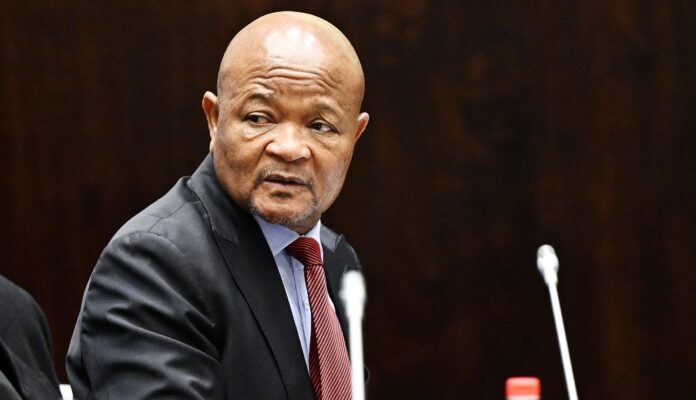Police Minister Senzo Mchunu has told MPs that the national political killings task team (NPKTT) was not the brainchild of KwaZulu-Natal police commissioner Lt-Gen Nhlanhla Mkhwanazi.
During his first day of testimony before the Ad Hoc committee investigating allegations of political interference in the South African Police Service, Mchunu was asked to explain the mechanisms behind the formation of the NPKTT.
Evidence leader Adv Norman Arendse SC asked if Mchunu was aware of Mkhwanazi’s role in establishing the task team. Mchunu replied that he was, but cautioned that its formation had not been Mkhwanazi’s idea.
NPKTT not Mkhwanazi’s brain child
“I’m also aware what other role players played because it was not a one-man show. It was the interministerial task team giving a team of officials a task. Which they came back to present to them. It was always a group of people,” Mchunu said.
He added that the NPKTT was never a legitimate unit to begin with. And he explained that under his leadership as police minister, appointed in June 2024, the NPKTT did not exist within the SAPS organogram.
“The political killings task team has never been part of the organogram. This is including when we dealt with the organogram under my leadership after I got appointed,” he said.
“We took the strategic plan and the annual plan. And we studied that and we came together to say, ‘what is the meaning of this in relation to the organisational structure of SAPS?’. We reviewed that.”
Mchunu contrasted it with the Cato Manor Unit in Cape Town, which he said was an actual police unit.
He said the review process sought to align existing structures with the strategic imperatives of the police department. The new organogram, he said, was finalised and signed only in May this year.
Unit had ‘expiry date’
“A unit would be deliberately established as part of the organogram for a particular purpose. It would be on a sustainable basis. It would be envisaged as a long-term arrangement,” he said.
“Task teams have been established from time to time at various levels. I suppose that even at a district level, a district commissioner would observe a particular problem in their area of jurisdiction. And they would say, ‘we need a particular team to deal with that particular problem’.”
He explained that task teams are mission-specific and temporary. With members returning to their posts once the mission is complete.
“There was always an element of a timeframe. You don’t establish a task team on a permanent basis. A task team has a day of starting and a day of ending,” he emphasised.
“This particular task team was established for such, as a ‘task team’. This task will be evaluated from time to time and assessed whether it would still be needed as time went on. That’s the practice.”
Mchunu told the committee that he had known of the NPKTT long before becoming police minister. He discussed it during several Cabinet meetings while serving in other departments.
Several task teams disbanded before
“I became aware that there was an interministerial task team that was established as an intervention by the president in 2018. What I came to know later is the political intervention by the president,” he said.
He said President Cyril Ramaphosa’s intervention had three tiers: the IMC, a steering committee, and the NPKTT.
“The operational one [was] right on the ground [involving] people who were operatives,” he said.
Mchunu said similar task teams for KZN were previously formed under ministerial authority in 2014 and 2016. One was disbanded in 2016 and another in 2018, to make way for the president’s Inter-Ministerial Committee (IMC).
He said the current NPKTT was a work involving ministers.
Forced to take decision on PKTT
“They put in all the ideas as they did. Still, ministers, and the chair is a minister, and he goes on with the work. What happened in the 7th administration [is that] there is no interministerial task team in this regard. There isn’t,” he said.
He added that following the May 29 2024 elections, no IMC existed to oversee the NPKTT. This left him to inherit the structure without formal grounding.
“You land in that situation. You start working and continue working. At a particular time, considering a number of factors, you take a particular decision,” he said.




